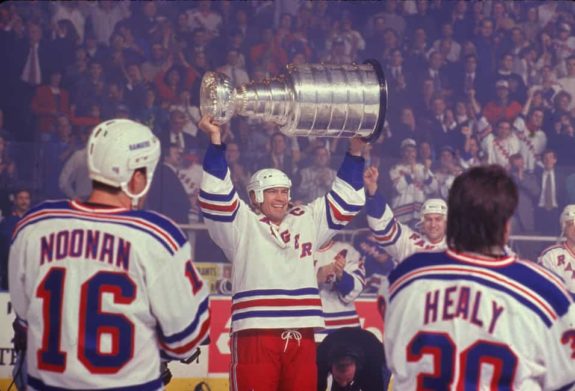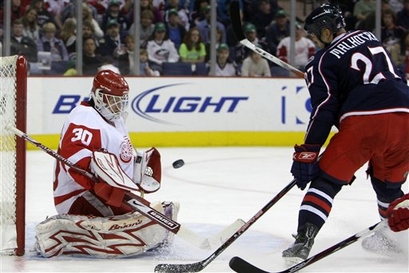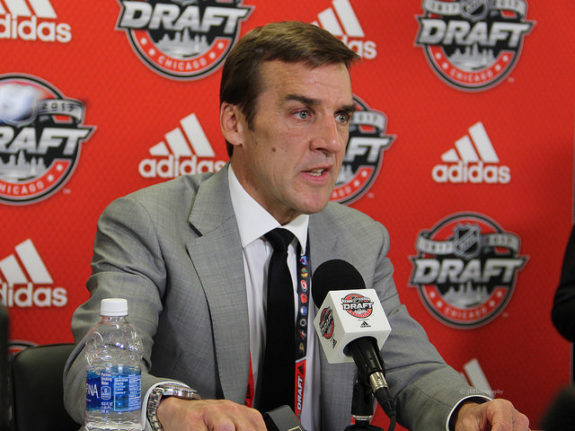July 13 has been all about returning to sites of great success throughout National Hockey League history. A handful of Hall of Fame players and coaches made return trips to teams they were either drafted by or hoisted Stanley Cups for.
An Early Blockbuster Trade
Less than three months after winning the Stanley Cup, the Detroit Red Wings made a huge trade on July 13, 1950. They completed a nine-player deal with the Chicago Blackhawks by trading Pete Babando, Harry Lumley, Jack Stewart, Al Dewsbury and Don Morrison in return for Jim Henry, Bob Goldham, Gaye Stewart and Metro Prystai.
Babando’s last play with the Red Wings was scoring in double-overtime of Game 7 of the Stanley Cup Final against the New York Rangers. He would never reach the postseason again in his career.
In the end, the trade winded up being pretty even for both clubs. Dewsbury, a defenseman, had the best run with the Blackhawks, scoring 26 goals and 101 points in 323 games. Prystai scored 71 goals and 192 points, in 284 games, before being traded back to the Blackhawks for Lorne Davis in November of 1954. Less than a year later, he returned to Detroit again in a deal for Ed Sandford.
Messier Returns to Broadway
After three seasons with the Vancouver Canucks, Mark Messier returned to the Rangers on July 13, 2000. The deal was made just over a month after Glen Sather was named general manager. Sather won five Stanley Cups with Messier when he was the general manager of the Edmonton Oilers before he traded him to New York in 1991.

During a press conference to announce the two-year contract, Brian Leetch, who took over as team captain when Messier left, gave the captaincy back to the veteran forward. Messier would play four more seasons with the Rangers. His first season back was his best of the four with 24 goals and 67 points. He wouldn’t score more than 18 goals in a season for the rest of his tenure. The Rangers failed to qualify for the Stanley Cup playoffs in all four of his seasons back with the team.
Hall of Famers Get New Deals
Messier wasn’t the only future Hockey Hall of Famer to find a new home on this date. On July 13, 1998, Ron Francis signed with the Carolina Hurricanes, returning to the franchise his career began with. After drafting him with the fourth overall pick of the 1981 NHL Entry Draft, he played a decade for the Hartford Whalers, scoring 264 goals and 821 points.
After eight seasons and two Stanley Cup wins with the Pittsburgh Penguins, Francis suited up for 472 games, over six seasons, for the Hurricanes. He scored 118 goals and 236 points during this time. He had six goals and 16 points during the 2002 postseason, helping the Hurricanes reach the Stanley Cup final for the first time in franchise history.
Two years later, on July 13, 2000, Paul Coffey signed with the Boston Bruins, joining a franchise with a rich history of offensive-minded defensemen. He would play the final 18 games of his career, picking up four assists, before being released on Dec. 15, 2000. The Bruins started the 2000-01 season with both Coffey and Ray Bourque on the roster, but both were gone by early March.
On that same date, another star returned to the team that drafted him when Dave Andreychuk signed with the Buffalo Sabres. He played his first nine-plus seasons with the Sabres after they drafted him in the first round of the 1982 NHL Entry Draft. After playing for the Toronto Maple Leafs, New Jersey Devils, Bruins and Colorado Avalanche, he scored 20 goals and 33 points for the Sabres during the 2000-01 season.
Exactly one year later, on July 13, 2001, Andreychuk made his final stop in the NHL when he landed with the Tampa Bay Lightning. He played four seasons with the Lightning, scoring at least 20 goals in three of those seasons. He finally got to raise the Stanley Cup, in 2004, after 22 seasons in the league.
Odds & Ends
On July 13, 1990, the Red Wings hired Bryan Murray and both head coach and general manager. He replaced Jacques Demers as coach and took over the general manager job for Jim Devellano, who was promoted to vice president. Murray coached the team for three seasons before being replaced by Scotty Bowman. He stayed on for one final season, 1993-94, as general manager. Martin Lapointe, Chris Osgood and Darren McCarty were among his best draft picks in Detroit.

The lockout that cost the NHL the entire 2004-05 season finally came to an end on July 13, 2005. The biggest addition to the new six-year collective bargaining agreement was the establishment of a salary cap for the first time in league history.
The Devils named Jacques Lemaire as their new head coach on July 13, 2009. This was Lemaire’s second stint as Devils’ coach after he led them to their first Stanley Cup championship in 1995. After leaving New Jersey in 1998, he became the first head coach in Minnesota Wild history, spending eight seasons behind their bench. Lemaire retired following the 2009-10 season, but was coaxed to return for the final 49 games of the 2010-11 season after his replacement, John MacLean, was fired.
The Vegas Golden Knights hired George McPhee as their first general manager on July 13, 2016.

The move came just over two years after his 17-season tenure as general manager of the Washington Capitals came to an end. McPhee won the NHL General Manager of the Year Award in 2017 after building a Golden Knights team that won the Pacific Division and made it to the Stanley Cup Final in its first year of existence.
Happy Birthday to You
There are 19 players who have dressed in at least one NHL game born on this date. The most notable of the bunch are Bill Collins (77), Bob Carpenter (57), Andreas Lilja (45), Sheldon Souray (44), Jean-Francois Berube (29), Mike Reilly (27) and the late Hall of Famer Punch Broadbent and Ken Mosdell.